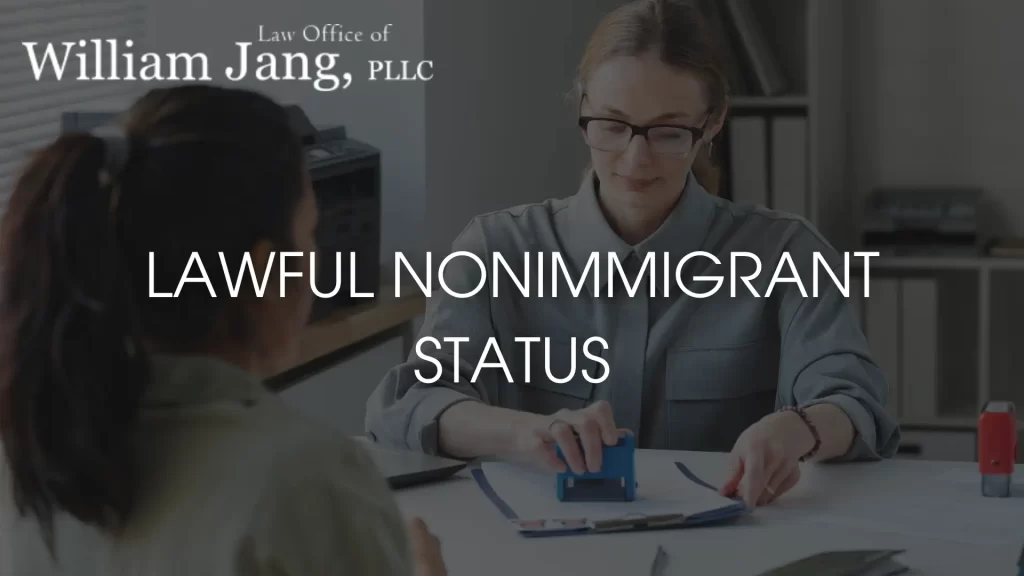
When non-citizens come to the U.S., they do so either under immigrant status (meaning they intend to permanently live in the U.S. as a lawful permanent resident or after becoming naturalized as a U.S. citizen) or nonimmigrant status (meaning they intend to come to the U.S. for a limited period). Non-citizens who enter the U.S. under nonimmigrant status must maintain lawful status or face potential deportation if located by immigration officials. Nonimmigrants have various rights and restrictions on their presence in the U.S. and must follow specific rules or procedures to maintain their lawful status and presence.
Nonimmigrant Visa Categories
U.S. immigration law has established multiple types of nonimmigrant visas. The type of visa that a non-citizen might apply for will depend on the purpose of their travel to the United States. Non-citizens who intend to stay in the U.S. temporarily will typically need a nonimmigrant visa. Common examples of nonimmigrant visa categories include:
- H-1B: Temporary workers in specialty occupations
- H-2A: Temporary agricultural workers
- H-2B: Temporary nonagricultural workers
- H-3: Trainees
- O-1: Workers with extraordinary abilities
- P-1: Internationally recognized athletes or entertainers
- P-2: Artists or entertainers in reciprocal exchange programs
- P-3: Artists or entertainers in cultural programs
- Q-1: Workers in international cultural exchange programs
- R-1: Religious workers
- TN: Professionals from Canada or Mexico
- L-1: Intracompany transferees
- E-1: Treaty traders
- E-2: Treaty Investors
- I-1: Members of foreign media
- F-1: Academic students
- F-3: Canadian or Mexican commuter academic students
- M-1: Vocational students
- M-3: Canadian or Mexican commuter vocational students
- J-1: Exchange visitors
- A-1: Ambassadors and career diplomatic or consular officers
- A-2: Foreign government officials and employees
- G-1/G-2/G-3: Principals and representatives of foreign governments
- G-4: International organization officers and employees
- B-1: Temporary visitors for business
- B-2: Tourists
- C-1/C-2/C-3: Non-citizens in transit through the U.S. or to the United Nations
- K-1: Fiancées of U.S. citizens
- K-2: Spouses of U.S. citizens
- K-4: Children of U.S. citizens
- V-1: Spouses of lawful permanent residents
- V-2: Children of lawful permanent residents
- D: Air or sea crewmembers
- T-1: Victims of human trafficking
- U-1: Victims of qualifying criminal activity
Rights and Restrictions for Nonimmigrants
Non-citizens who enter the U.S. on a nonimmigrant visa have the right to remain in and move around the U.S. until the expiration of their I-94 documentation, which serves as proof of their legal status as visitors. U.S. Customs and Border Protection will issue an I-94 to a nonimmigrant upon admission to the U.S. today; CBP typically issues confirmation numbers that nonimmigrants can use to look up their I-94 online.
However, nonimmigrants may only have other rights while in the U.S. if their visa grants such rights. For example, only some nonimmigrant visas allow a foreign national to obtain employment in the U.S. A nonimmigrant who does not have work authorization cannot lawfully work in a U.S. job.
Nonimmigrants must present themselves to CBP at a port of entry for inspection to obtain lawful admission to the U.S. A nonimmigrant who enters the U.S. without inspection has no lawful presence. Depending on the type of visa, a nonimmigrant may have to present proof of departure travel from the U.S. to demonstrate they do not intend to remain in the U.S. past the expiration of their visa.
Nonimmigrant visas allow foreign nationals to stay in the U.S. for a limited period. A nonimmigrant’s I-94 will list the date the nonimmigrant must leave the U.S. A nonimmigrant who remains in the U.S. past the expiration of their visa without renewing their visa or adjusting their immigration status begins accruing unlawful presence. Foreign nationals who accrue unlawful presence may jeopardize their eligibility to adjust their immigration status or obtain future visas.
Maintaining Lawful Nonimmigrant Status
 Nonimmigrants must have lawful status and lawful presence. Nonimmigrants can lose lawful status without beginning to accrue unlawful presence in the U.S. For example, a foreign national on a temporary work visa loses their lawful status if they quit or get terminated by the employer that sponsored their visa. However, they do not start accruing unlawful presence until their period of authorized stay on their I-94 expires.
Nonimmigrants must have lawful status and lawful presence. Nonimmigrants can lose lawful status without beginning to accrue unlawful presence in the U.S. For example, a foreign national on a temporary work visa loses their lawful status if they quit or get terminated by the employer that sponsored their visa. However, they do not start accruing unlawful presence until their period of authorized stay on their I-94 expires.
Contact an Immigration Attorney Today
If you wish to visit, live, or work in the U.S. temporarily, you will need a nonimmigrant visa to enter the country lawfully. Our firm has experienced Austin immigration attorneys who can help you navigate the complexities of U.S. immigration law and the visa application process. Call the Law Office of William Jang, PLLC at (512) 323-2333 or contact us online today for an initial consultation to discuss your options and learn more about obtaining lawful nonimmigrant status.
Related Posts:
Trump Wants ‘Extreme Vetting’ of Potential United States Immigrants
Republican Party Takes Hard-Line Stance on Immigration Issues








